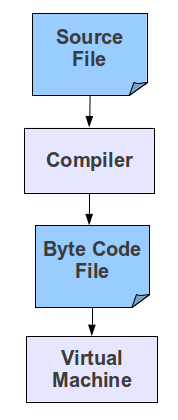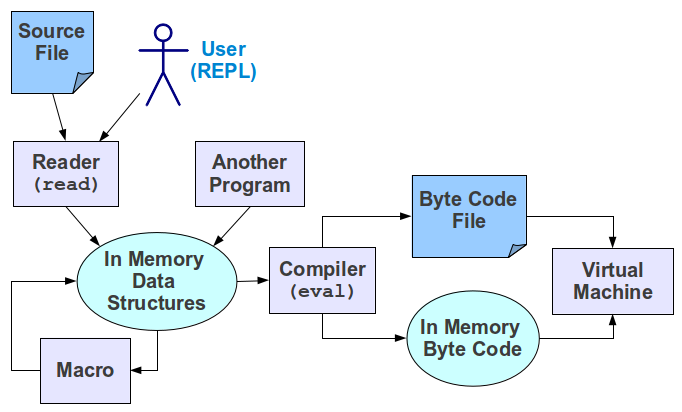
Clojure Macros
Conventional Java Compilation

Clojure Compilation

Macro API
| Function/Macro/Special Form | Description |
|---|---|
|
(defmacro name [params*] body) |
Like defn, but the resulting function name is declared as a macro and will be used as a macro by the compiler when it is called.
|
| (macroexpand-1 form) | If form represents a macro form, returns its expansion, else returns form. |
| (macroexpand-all form) |
Recursively performs all possible macroexpansions in form. You must import the namespace clojure.walk in order to use it.
|
| `form |
Syntax-quote. For all forms other than symbols, lists, vectors, sets and maps,
For symbols, syntax-quote resolves the symbol in the
current context, yielding a fully-qualified symbol (i.e. For lists/vectors/sets/maps, syntax-quote establishes a template of the corresponding data structure. Within a template, unqualified forms behave as if recursively syntax-quoted, but forms can be exempted from such recursive quoting by qualifying them with unquote and unquote-splicing (see below). |
| ~form | Unquote. Within a template, form will be treated as an expression to be replaced by its value. |
| ~@form | Unquote-splicing. Within a template, form will be treated as an expression (that must evaluate to a collection) to be replaced by its sequence of values. |
Examples:
`(42 map f [1 2 3]) ⇒ (42 clojure.core/map user/f [1 2 3]) `(a b# c b#) ⇒ (user/a b__46__auto__ user/c b__46__auto__) `(1 2 (+ 1 2)) ⇒ (1 2 (clojure.core/+ 1 2)) `(1 2 ~(+ 1 2)) ⇒ (1 2 3) `(1 2 (range 5)) ⇒ (1 2 (clojure.core/range 5)) `(1 2 ~(range 5)) ⇒ (1 2 (0 1 2 3 4)) `(1 2 ~@(range 5)) ⇒ (1 2 0 1 2 3 4) ;;; This macro defines a no-arg function called ‘name’. When the said ;;; function is called, it prints "Hello ‘name’!". (defmacro make-hello-fun [name] `(defn ~name [] (printf "Hello %s!%n" (quote ~name)))) (macroexpand-1 '(make-hello-fun world)) ⇒ (clojure.core/defn world [] (clojure.core/printf "Hello %s!%n" (quote world))) (make-hello-fun world) (make-hello-fun dude) (world) ; Prints "Hello world!" (dude) ; Prints "Hello dude!"